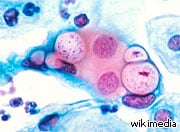The ‘safer sex’ message is getting through but it is not working, according to an official report into the progress of Scotland’s sexual health strategy.
The report says that all age ranges know about ‘prevention’ but the data show troubling increases in sexual infections and the teenage pregnancy rate remains high.
The news is likely to cast fresh doubt on the effectiveness of the current ‘take a fistful of condoms’ approach to sex education, which critics accuse of encouraging promiscuity.
STIs
The report warns that the high rates of sexually transmitted infections (STIs), teenage pregnancies and abortions show that many young people in particular are continuing to endanger their sexual health.
The study shows that those aged under the age of 25, particularly women, are most likely to become infected with a STI.
It reveals that during 2009 79% and 76% of genital chlamydia and gonorrhoea diagnoses in women were made in those aged under 25. These figures fell slightly to 63% and 56% respectively for young men.
The report also notes that the teenage pregnancy rate in Scotland has failed to fall significantly, and remains higher than most other Western European countries.
Abortion
And it shows that women aged under 25 are more likely to have an abortion than those who are older.
During 2009 the abortion rate for women in Scotland aged between 16 and 19 was 22.3 per 1,000. The figure was 22.0 per 1,000 for those aged 20 to 24.
The study also warns that men who have sex with other men are continuing to engage in high risk behaviour and have an elevated risk of contracting HIV.
Risky
But medical experts note that anal intercourse is, by its nature, the most risky form of sexual activity.
Sexual health specialists Dr John Dean and Dr David Delvin have warned that the practice carries a greater risk of spreading sexually transmitted infections than almost any other type of sexual activity.
And the UK Blood Transfusion and Tissue Transplantation Services will not accept blood donations from men who have had sex with men, regardless of whether they used a condom. This policy is based on an impartial assessment of the available evidence and is designed to ensure a safe blood supply.
The Scottish Sexual Health report was produced by the Sexual Health Epidemiology Group, using information from Health Protection Scotland and the Information Services Division.
Multi-million
In September a multi-million pound Scottish Government sexual health scheme aimed at children as young as ten was labelled a failure by academics, just as its forerunner was in 2005.
Healthy Respect Two is a continuation of the controversial Healthy Respect programme which was blasted after teenage pregnancy rates actually rose in the areas where the scheme focused its attention.
Healthy Respect promotes sex education in schools and offers condoms and the morning-after pill at drop in centres.
Limited
A report on the Healthy Respect Two scheme, which was aimed at children between the ages of ten and 18 across the Lothian area, found it has had “limited beneficial impact” commenting that girls gained “very little or experienced health losses” as a result of the programme.
In April it was revealed that Scottish children as young as eleven were receiving sex education from 14-year-olds in a bid to cut teenage pregnancies. Critics described the scheme as “flawed”.
The Health Buddies pilot project, in Dundee, involved pupils as young as 14 teaching younger children about issues such as contraception and puberty.
Homosexual
The so-called ‘health buddies’ were also expected to direct youngsters to where they could get advice on homosexual issues.
Norman Wells, director of the Family Education Trust, commented: “Parents and teachers should not be abdicating their responsibilities in this way and using school children to offer advice in areas where they lack the necessary wisdom, experience and maturity.”

